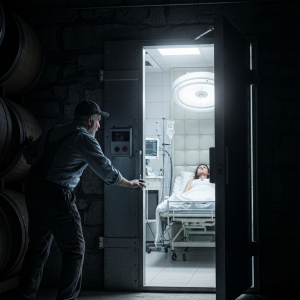“Aura,” the newest star in the culinary sky of New York City, was less a restaurant and more a temple. It was a place of worship dedicated to the genius of one man: Chef Julian Thorne. At twenty-eight, Julian was a prodigy, a culinary supernova whose ambition was eclipsed only by his monumental ego. His kitchen was a gleaming, stainless-steel altar where he ruled as a tyrannical god, and his staff were his terrified, scurrying acolytes.
Among them, the most invisible was the new dishwasher, James. He was an old man, his face a roadmap of wrinkles, his hands gnarled but surprisingly steady. He was quiet, diligent, and moved with an unhurried grace that Julian mistook for slowness. To the celebrated chef, James was a piece of ancient, failing equipment, a constant irritant in his perfectly calibrated machine.
“Faster, old man, faster!” Julian would often scream, his voice echoing off the tiled walls. “My creations deserve to be served on immaculate plates, not plates that have been waiting on your convenience!” James would simply nod, his eyes revealing nothing, and continue his work.
Tonight, the tension in the kitchen was dialed to an unbearable degree. Genevieve Croft, the most feared food critic in the country—a woman known simply as “The Blade” for her devastatingly precise reviews—was seated at table seven. Her presence had turned Julian into a caged panther, pacing, snarling, and seeing fault in everything and everyone.
But James, standing amidst the steam and chaos, seemed utterly unaffected. He scrubbed pots with a rhythmic, methodical calm, his gaze occasionally drifting out into the controlled bedlam of the kitchen. He wasn’t just washing dishes. He was watching. He was observing. He was judging.
The symphony of the dinner service was nearing its crescendo. Genevieve Croft’s main course, a pan-seared scallop dish of Julian’s own design, was just moments from being plated. The tension was a physical presence in the air, thick and suffocating. It was in this moment that a young server, his hands trembling under the pressure, made a fatal error. A stack of clean, hot dinner plates slipped from his grasp, shattering on the tile floor with a sound like a gunshot.
The entire kitchen froze. Julian, who was applying a delicate sauce with the focus of a surgeon, spun around, his face contorting into a mask of pure fury. He couldn’t scream at the server—the boy was already backing out into the dining room, his face ghost-white, and any outburst could be heard by the critic.
So, Julian turned, his rage seeking a safe, consequence-free target. His eyes landed on James, who was quietly sweeping up a few stray vegetable peelings near his station. In Julian’s warped, pressure-cooked mind, the old man was somehow responsible for the toxic atmosphere of failure.
He stormed over to the dish pit, his fists clenched. The entire kitchen staff held their breath, witnessing the eruption they all knew was coming.
“You!” Julian roared, his voice low and venomous, yet carrying to every corner of the kitchen. He jabbed a finger in James’s face. “This is your fault! Your sluggish, miserable presence casts a pall on this entire kitchen! You’re useless! A worthless old man! Slow, stupid, and in my way!”
He kicked the bin of broken plates, sending shards skittering across the floor. “Maybe I should just throw you out in the alley where you belong! You are a disgrace to my restaurant!”
The verbal assault was brutal, personal, and utterly humiliating. It was a public execution of a man’s dignity, performed for an audience of his silent, terrified colleagues.
In the ringing silence that followed, everyone expected James to flinch, to cower, to apologize. He did none of those things. He simply stood there, his calm unshaken, and looked at the raging young chef. The look in his eyes was not one of fear or shame. It was a look of profound, soul-deep disappointment. It was the look of a creator staring at a beautiful, but fatally flawed, creation.
Without a word, James set down his broom. He moved to his station, untied the strings of his damp, grey apron, and folded it neatly, placing it on a clean countertop. He then meticulously washed and dried his hands. Each movement was deliberate, calm, and filled with a chilling finality. He was no longer an employee.
He turned and walked towards the kitchen’s rear exit, the one that led to the back alley. The kitchen staff watched, bewildered. Julian, misinterpreting the quiet retreat as a victory, let out a triumphant, ugly sneer. “That’s right! Get out! Go die somewhere else!”
As James pushed open the heavy steel door, he paused in the threshold. He pulled an old, simple-looking smartphone from his pocket. His thumb moved across the screen, typing a single, two-word text message.
To: Isabelle. Message: It’s time.
Then, he stepped out into the cool night air, leaving the toxic heat of the kitchen behind him.
Less than five minutes later, a sleek, black Bentley sedan, silent as a shark, pulled up to the front of Aura. The valet, accustomed to seeing luxury cars, nearly dropped his keys at the sight of this one. It was a car that radiated a different level of power.
A woman emerged from the back seat. She was in her late thirties, dressed in a razor-sharp, dark blue power suit. This was Isabelle Finch, a name that made Wall Street titans sit up straight. As CEO of Finch Hospitality Group, she was one of the most powerful figures in the industry.
But she didn’t walk towards the restaurant’s grand front entrance. Instead, she strode purposefully down the side of the building, her high heels clicking with an unnerving authority on the pavement. Trailing a respectful step behind her was the company’s stern-faced head of Human Resources. They were headed for the staff entrance.
Back in the kitchen, Julian was still riding the high of his power trip. When the back door swung open, revealing two strangers in expensive corporate attire, he was ready to unleash another tirade. “This is a closed kitchen! We are in the middle of service! Who the hell do you think you are?”
Isabelle Finch completely ignored him, her eyes scanning the kitchen as if he were a piece of furniture. Her gaze swept past the terrified line cooks, past the pastry station, and settled on the quiet figure of James, who had just stepped back inside.
She walked directly towards him, her path cleaving through the tense kitchen. The staff parted before her like the Red Sea. When she reached the old man in the simple dishwasher’s uniform, she stopped. Julian watched, his mouth agape, as this formidable, powerful woman bowed her head ever so slightly in a gesture of profound respect.
Her voice was clear, calm, and carried across the now-silent kitchen.
“Father,” she said. “I apologize for the delay. The emergency board meeting has been convened. They are waiting for your final decision in the private dining room. Everything is ready.
The word “Father” detonated in the kitchen’s silence. The blood drained from Julian Thorne’s face. His mind, which seconds before had been consumed with scallops and sauces, was now frantically, horrifyingly, connecting the dots. Finch. Isabelle Finch. The old dishwasher, James… her father. James, the legendary, reclusive founder of the entire Finch Hospitality Group. The man who owned every brick, every plate, every contract in this building.
He had just verbally crucified the anonymous king in his own throne room.
The entire kitchen staff stared, their expressions a mixture of shock, terror, and a dawning, glorious sense of liberation. They were witnesses to a moment that would become legend.
Isabelle finally turned her icy gaze upon Julian. Her voice was devoid of all emotion, which made it all the more terrifying. It was the voice of pure, corporate finality.
“Chef Julian Thorne,” she said, each word a perfectly polished stone dropped into a deep well. “By order of the Chairman of the Board, Mr. James Finch, your employment contract is terminated, effective immediately. The cause is gross professional misconduct and a direct violation of the foundational principles of this company.”
The head of HR stepped forward, holding a tablet. “Your severance has been voided by the morality clause in your contract. Security will escort you to your office to collect your personal knives. You have ten minutes.”
Julian stood frozen, his face a mask of disbelief and horror. He was ruined. And standing just a few feet away, by the now-open kitchen door, was Genevieve Croft, “The Blade.” The critic had been drawn by the commotion and had heard every single word. She had her story. It wasn’t about the food. It was about the spectacular, self-inflicted death of a star.
James Finch never wore the dishwasher’s apron again. In the week that followed, he and Isabelle systematically dismantled the toxic culture Julian had built. The entire kitchen staff was interviewed, their grievances heard, their loyalty rewarded. The sous-chef, a talented and compassionate woman whom Julian had constantly belittled, was promoted to Head Chef.
The review from Genevieve Croft was published the following Tuesday. It was brutal. It barely mentioned the food, focusing instead on the “putrid, rotten core of a kitchen run on fear,” and concluded that “no meal, however technically brilliant, can taste good when it is seasoned with humiliation.” The article ended with a laudatory mention of the founder’s undercover assessment and the swift, decisive action taken. Finch Hospitality Group’s stock rose by ten percent.
A month later, Aura was a different restaurant. The frantic, terrified energy was gone, replaced by a quiet, collaborative hum. The food was just as brilliant, but it was now created by a team that felt respected, not terrorized.
The final image was of James Finch. He was no longer the invisible old man in the shadows. He sat at table seven, dressed in a beautifully tailored suit, looking every bit the elder statesman of the culinary world. He was not there as an owner, but as a guest. The new Head Chef personally brought out his main course, placing it before him with a smile of genuine gratitude.
James took a bite, savored it, and then looked around at the bustling, happy dining room. He looked towards the kitchen, where he could see a team working in harmonious concert. He smiled. His restaurant, his legacy, was finally in the right hands.
Of course. Here is the continuation of the story, expanding on the aftermath of Julian’s downfall and the beginning of Aura’s new era under the leadership of James and Isabelle Finch.
The morning after the storm was unnaturally quiet. The gleaming kitchen of Aura, usually a hive of tense activity by 7 AM, was still and silent. The staff had been told to come in at ten, and they had arrived as a group, huddling together near the staff entrance, uncertain of their future. They were met not by an angry executive, but by James Finch himself, now dressed in a simple but elegant cashmere sweater, a warm smile on his face.
He and Isabelle had called one person in early. Maria Flores, the sous-chef Julian had taken special pleasure in tormenting, stood nervously in the center of the empty dining room. She had expected to be fired along with the rest of Julian’s senior team. Instead, she found herself sitting at the infamous table seven, across from the owner of the company and its CEO.
“Maria,” James began, his voice gentle but with an undercurrent of steel. “I’ve been washing dishes here for three weeks. I’ve seen everything. I saw Chef Thorne take credit for your brilliant sauce pairings, and I saw him berate you for using a quarter teaspoon too much salt when he was the one who distracted you.”
He leaned forward. “I also saw you stay late, long after he was gone, to personally show the new line cook the proper way to filet a Dover sole. I saw you share your staff meal with the server who dropped those plates because he was too scared to go get another. We’ve seen your talent, Maria. But more importantly, we’ve seen your character.”
Isabelle slid a handsome leather-bound folder across the table. “This is a contract to be the new Executive Chef of Aura,” she said, her tone professional but with a hint of a smile. “The salary is thirty percent higher than what we were paying Chef Thorne. You will also have a significant budget for team development and a zero-tolerance policy for workplace abuse, which we will back you on, unequivocally.”
Maria stared at the folder, her hands trembling as she opened it. Tears welled in her eyes as she saw her name printed in elegant script above the title she had only ever dreamed of. She looked up at James, her voice choked with emotion. “I… I don’t know what to say, sir.”
“Say you’ll help us build a restaurant that is as beautiful on the inside as it is on the outside,” James replied. “Say you’ll lead with respect. The food will follow.”
That evening, a revolution took place in the kitchen of Aura. It was quiet, it was delicious, and it began with the staff meal. Under Julian, the “family meal” was a joke—whatever was leftover, slapped onto a plate and eaten in tense silence, with Julian often not eating at all, preferring to stand over them like a hawk.
Tonight, Chef Maria Flores had prepared a rich, fragrant chicken and chorizo paella. She had made it herself, and she insisted that everyone, from the servers to the dishwashers, serve themselves before she took her own plate. The team gathered around the large prep tables, and for the first time, they talked. They laughed.
“David,” Maria said, addressing the young server who had dropped the plates the night before. His name was David, and she had made a point to learn it. “Taste this sauce for the halibut. Tell me what you think. Too much lemon?”
The boy, who had spent the last six months living in mortal fear of Julian, stared at her, wide-eyed. He was being asked for his opinion. He took the spoon she offered, tasted the sauce, and a slow smile spread across his face. “It’s perfect, Chef.”
The simple act was a message to everyone: this was a team now. Every palate was valued, every opinion mattered. The oppressive fear that had been the main ingredient in Julian’s kitchen had been replaced by a newfound energy of collaboration and mutual respect.
When the first orders started coming in, the kitchen moved with a new kind of rhythm. It was still fast, it was still precise, but the frantic, panicked edge was gone. It was the hum of professionals working in concert, led by a conductor who trusted her orchestra. James Finch stood in the back, near the dish pit where he had worked just 24 hours earlier, and watched with a deep, profound satisfaction.
Julian Thorne’s fall from grace was as spectacular as his rise. Genevieve Croft’s article had not just criticized a restaurant; it had indicted a celebrity, and the industry, eager to distance itself from his toxicity, excommunicated him overnight. His book deal was cancelled. His television appearances were pulled. The culinary god had been revealed as a petulant, cruel mortal, and no one wanted to be associated with him.
Two weeks after his firing, a desperate, blocked number came through to Isabelle’s private line. She answered, her voice cold as ice. “This is Finch.”
“Isabelle… it’s Julian,” the voice on the other end was a pathetic shadow of its former arrogance. “Listen, I… I messed up. I was under pressure. The critic, the stress… I’m willing to apologize. Publicly. To your father. We can spin this. A redemption story.”
Isabelle let the silence hang for a moment, letting him stew in his own desperation. When she spoke, her words were surgically precise. “There is nothing to ‘spin,’ Julian. You were given one of the greatest opportunities in this industry. You were given a brilliant team and our complete financial backing. And you used that power to abuse and humiliate people you deemed beneath you.”
She paused. “The brand you spent your whole life building was yourself. And you were the one who publicly demolished it. My father and I simply gave you the stage to do it on. There is nothing left for us to discuss. Do not call this number again.” She ended the call before he could reply, severing the final tie.
Later that evening, she joined her father at his home, a quiet, comfortable house worlds away from the glamour of his empire. He was reading in a worn leather armchair, a glass of wine at his side.
“It’s done,” she said, pouring a glass for herself. “Aura’s first two weeks under Maria have had the highest staff retention and the best customer satisfaction scores of any restaurant opening in our portfolio’s history.”
James smiled, closing his book. He looked at his daughter, the brilliant CEO he had raised to be both smart and kind. “You see, Izzy,” he said, using his old pet name for her. “Anyone with money can build a beautiful room and hire a talented chef. That’s the easy part. But it takes character to build a culture. A good chef can make you a great meal that you’ll forget in a week. A great culture, built on respect, creates a legacy that lasts for generations.”
He raised his glass to her. “I’m not in the restaurant business,” he said, his eyes twinkling. “I’m in the legacy business.” And together, they toasted to the future they were building, one plate, and one person, at a time.




